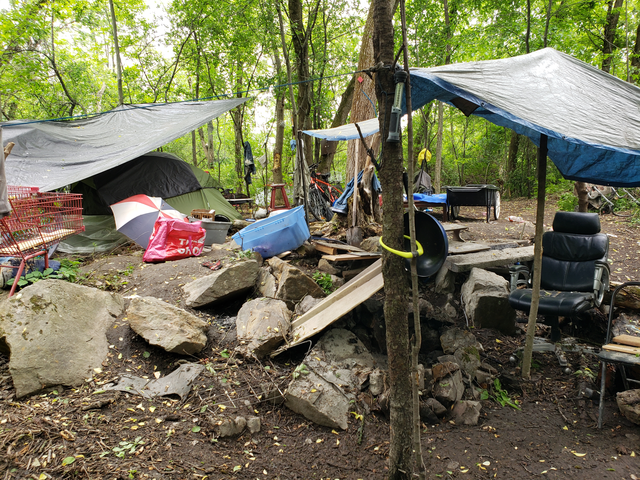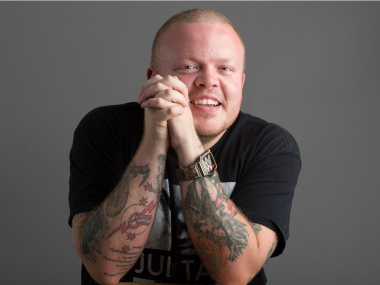My name is Leigh Bursey. I am a 32-year old municipal councillor in the beautiful city of Brockville, Ontario, Canada. Currently in my third term of governance, I have had the privilege of representing this incredible city for the last ten years of my life.
Some look at me and see a spunky punk rocker, covered in tattoos, who probably uses too many expletives to make a point. In fact, one thing that has been consistent for me the last number of years as a public figure is that I am bombastic, colourful, and generally unapologetic. This outgoing exterior does not mean that I am not aware of the world around me or the challenges many face. To ignore these challenges would be to ignore everything that inspires me to battle through my own depression, my family’s poverty cycles, and my own shortcomings as an adult still finding his place.
There was a time in my adolescence where my mother and I pitched a tent in a provincial campsite, fleeing a domestic situation that stripped us of our belongings, our finances, and our dignity. Hope was all we had. That and a killer playlist of songs that would become the soundtrack to our misfortunes, as well as our personal triumphs. Identifying as homeless was never something I was comfortable with until I came to better understand what that term meant. You see, like many, I often pictured homelessness as a traditional stereotype that fostered a large urban narrative.
The purpose of this blog is to do my best to articulate that homelessness and precarious housing is not confined to large urban centres. In fact, not only does it exist in my small city, but it exists just a few hundred feet from my own front door.
I live in the provincial riding of the Ontario Minister of Municipal Affairs and Housing. Regardless of political affiliation, budgets are sometimes balanced on the backs of the poor, and even the most sympathetic to those wedged between the cracks of social institutions, may only have a limited grasp of the realities that so many are facing. As a city councillor, I have noticed that people see me as an ally and are comfortable sharing with me the fears they have of losing stable housing in our city.
Below is a snapshot of these fears and concerns, shedding light on real time issues that are being felt by citizens in my own community (many of them youth, single mothers, working, and struggling in crisis). These are not the citizens who are benefiting from “more homes, more choices”, and it is my opinion that if the system continues to fail them, how can we as a community ever expect them to do anything but fail themselves?
“My ex was abusive! I lived in Ottawa with him for two years and I had nowhere to live when I came back, so my mom let me move in with her.”
In creating government responses to preventing homelessness, an understanding that cyclical poverty, societal disconnection, and chronic addictions are not quick-fix problems must be predominant. These cycles of poverty are present even in rural Ontario. A shortage of public and private market housing (that is both affordable and safe, as well as modern and inclusive) - is not a myth. It is an unfortunate reality for so many of the people who reach out to me in despair.
“Even in some of our cheaper neighbourhoods, rent is going up to close to $1000 a month. I work full-time and that is almost 1 1/2 of my pay cheques. I’m expected to use $400 a month for groceries, personal needs and transportation? I don’t know how people do it really."
If provincial and federal funding dollars are continuing to support only those experiencing chronic homelessness and not considering existing units struggling to maintain tenants who could become precariously housed, we will continue to fail to prevent catastrophe in the lives of these individuals and families. The result of increasing wait-lists for affordable housing will mean blossoming homelessness in our area. While there is funding to support many of the vulnerable elements of our populations, organizations often can’t access a lot of those dollars, since they themselves struggle with precarity and often lack the capacity to apply for funding increases.
“We thought about camping at St. Lawrence Park (in Brockville) if we became homeless. Putting all our stuff in storage and camping until we find something still might happen. The search is hard. Apartments are high in demand, but with these rent prices the ‘less fortunate’ miss out.”
We must return to understanding the purpose of housing and homelessness support services, as opposed to getting caught in the weeds of particular program names and political agendas. Along with a deep investment in actually affordable homes, we must better understand the realities of poverty that lead people into homelessness and how we can work to support them before they lose stable housing.
“It's not comfortable for my family to be in this situation. We are not bad people, and sometimes we feel treated as bad people because of our struggle. But we are trying so hard.”
A friend recently brought me to a homelessness encampment he had stumbled upon in the woods. I went to speak and learn from them, and I came to realise that one of the occupants was someone who once lived at a local a nonprofit housing corporation that I am familiar with. This individuals’ details struck me as hard to swallow. How did this gentleman go from stable, to a place of crisis? I got to know them and their plights, which has only highlighted the injustice that plagues trajectories into housing instability. Trouble with the law, a mistrust of institutions, lost identification, and the absence of basic needs make it easy to fall into and hard to exit homelessness, with the lack of options only driving people further into poverty. And if we continue to choose to regard homelessness as an urban-specific issue we will certainly be seeing more encampments.

The irony and unfortunate symbolism of people living homeless just a few hundred metres from the Ontario Minister of Housing's constituency office was not lost on me. To Minister Clark's credit, he did respond to me to indicate that certain local agencies had done their best to reach out to these folks and ease their burdens and address their issues, but had been met with little more than dismissiveness. Maybe this isolated situation is an example of issues that have deeper ties to our criminal justice system, our public mental health services, underlying addiction issues, or the broader distrust of government services. That said, they are but one example of many that exist in my city today.
Just because we have the appearance of more resources and awareness doesn’t mean that living comfortably is a reality for many people I love and respect. We have to speak with people to understand what is actually happening, and it is within our power to make the shift to prevention to support our communities. Let's not condemn those in need to poverty any longer, and let's not pretend that this issue isn't in our own backyards.
In my city (like many others), that couldn't be further from the truth.

